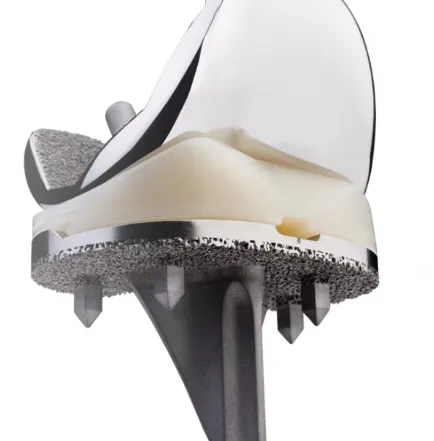Traditional Total Knee Replacement

Outpatient Total Knees
Outpatient Total Knees or “Same-Day Total Knees” are now possible with advancement in perioperative anesthesia, minimally invasive techniques, and early initiation of rehabilitation protocols after surgery. Postoperatively, our multi-modal pain medication regimen requires a lower use of opioid medications.
Our patients are now able to undergo rapid recovery from their outpatient total knee replacement. A “same-day knee replacement” is a total knee that the entire procedure and hospital stay requires a hospital stay that is less than 24 hours. Our rapid recovery protocols that decrease the amount of heavy-duty pain medications, enabling our patients to safely transition to recovering at home.
Why would I want to undergo an Outpatient Total Knee Arthroplasty?
- Recover at home – Patients are often more comfortable in an environment that is familiar to them. Going home allows our patients to avoid call lights, beeping IV equipment, other patients on the floor, and overnight nursing assessments.
- Higher Satisfaction – Undergoing a joint replacement in an outpatient surgery center leads to patients who are more satisfied with their overall experience.
- Lower rates of infection – Hospital and nursing facilities take care of very sick patients. Avoiding inpatient facilities allows our patients to avoid exposure to infectious organisms.
- More advanced care – Performing a surgery in an outpatient surgery center often allows more control by the surgeon over the patient’s care and overall experience.
- Cost Savings – Avoiding an unnecessary stay in the hospital will lead to lower costs including paying for hospitalist and nursing services when they are not necessary.
Am I a Candidate for an Outpatient Total Knee Arthroplasty?
Not all patients who undergo a total knee replacement are able to have an same-day total knee replacement experience. The most important criteria is that the patient is in overall good health without any serious medical conditions. All patients are assessed pre-operatively by their primary care physician and our pre-operative clearance staff. Lab studies and work-up by appropriate specialists are obtained. Our patients attend a preoperative joint class that will prepare you for your total knee replacement. This class discusses what to expect on the day of surgery as well as postoperative protocols. Postoperatively, our physical therapists will assess your ability to ambulate and your ability to be safe at home.
If at any point during the preoperative or postoperative care we decide that it is not safe for you to go home, we will have you admitted to the hospital until it is decided that you are safe for discharge.

Frequently Asked Questions about Same Day Knee Replacements (FAQ)
Long-distance travel should usually be avoided until at least after your initial post-operative visit with your surgeon. The concern with long-distance travel is the possibility of the development of a blood clot, or missing a postoperative complication.
Once you are on a long trip, Dr. Morton recommends that you get up to stretch or walk at least once per hour during a long trip. Taking 81mg of aspirin daily is a useful adjunct. Dr. Morton recommends starting aspirin 2 days before your trip, and 2 days after your trip to avoid blood clots. You may want to talk with your primary care physician if you have a history of stomach ulcers, allergies, blood clots, or bleeding disorders. Usually, patients will desire an aisle seat or a lay-flat seat for long distances during their initial recovery.
Your medical history will be carefully evaluated to ensure that you are a good candidate to return home on the same day after your knee replacement. After a discussion with your physician, we will decide if you can return home safely. We make sure that all of our patients work with a physical therapist to ensure that they can safely navigate the obstacles in their home before being discharged.
Your surgeon will evaluate your medical history and see if you are a good candidate to return home on the day of surgery. With modern medicine, anesthesia, and surgical technique, many of our patients are able to return on the same day as their knee replacements.
Blistering can be a side effect of the bandages or swelling after your replacement. Blistering is a rare phenomenon. If you have blistering, please call me to make sure that there are no complications to be concerned about.
Yes. In order to implant your new knee, we have to move the muscles and soft tissue to the side. Cutting the bone can cause a significant amount of blood flow. This will cause a large amount of bruising and discoloration after surgery.
These devices have fallen out of favor in the orthopedic community. We have found that these devices are expensive and have not made a difference in return to motion after a knee replacement. These have not been used for years by most orthopedic surgeons.
During a knee replacement, we cut through the infra-patellar branch of the saphenous nerve. This nerve is responsible for the sensation on the outside of your knee. This usually disappears slightly with time, but you will always have a numb area there. Some patients can develop a painful neuroma. I am happy to talk about any of your concerns about this numbness.
This is a complex question depending on what job type you are doing.
Desk job: I tell most patients that they will feel well enough to begin working around two weeks after surgery. Some patients who are gung-ho will even start working immediately after surgery.
Light Labor: Light labor that requires frequent walking or light lifting. Some patients may require 6 weeks to 3 months before returning to work. Close monitoring will be needed to help you determine when you are safe.
Heavy labor: Construction and other types of manual labor usually requires at least 3 months of recovery. Some patients will have to change their careers depending on their demands. Talk with your surgeon before returning to work.
We have our patients walking on the same day. patients who are expected to go home will have a course of physical therapy in the post-op unit to ensure that they are safe to go home.
This depends on if you drive a manual transmission car, and if your replacement involves your right or left knee. Patients who undergo a right knee replacement are going to take longer to start driving – sometimes up to 6 weeks.
I allow patients to drive when they reach the following goals: 1. No significant pain while driving, 2. No longer taking narcotics, 3. Able to stop in the event of an emergency such as a small child crossing the road.
Most patients are able to achieve this with a left knee replacement around two-weeks after surgery.
Modern knee replacements are performed on an outpatient basis. Many patients are able to go home on the same day, and sometimes the following day. This is because our pain control and anesthesia have significantly improved. Some patients who do not have adequate support at home will require a skilled nursing facility to recover until they are strong.
Custom implants and customized jigs are a technology that has not demonstrated to have brought significant value for patient outcomes. These devices have not been demonstrated to be more reliable than traditional knee replacements. It is likely because it does not take into account your soft-tissue anatomy at the time of surgery. This is the difference that robotic joint replacements provide.
While the science is conflicting on whether injections are associated with infected knee replacements, many insurance companies have made limitations on joint replacements after injections. If you have an injection, most insurance companies will not support payment for a knee replacement for 3 months after your injection. This is with the health of our patients in mind. Avoidance of infection is of utmost importance as an infection can have devastating consequences.
Robotic joint replacements are a hot-topic in hip and knee replacements. While you may not need a robot to perform your surgery, robotic knee replacements are able to provide a much more accurate positioning of your knee replacements and personalize the implantation to your anatomy. Much like anterior hip replacements are able to position our implants better and improve outcomes, I believe that robotic joint replacements can make the same improvements for knee replacements.
Partial and total knee replacement surgery have excellent track records. There are risks and benefits to both operations. Partial knee replacements often leave patients with a more “natural feeling” knee, while total knee replacements are able to provide the longest term result with lower risk of re-operation.
I usually recommend that people wait three months prior to having any dental work done. Please ask for antibiotics, especially within the first year of your surgery.
Tobacco use is known to be a significant risk factor for loosening, infection, or wound healing problems. Minimizing your tobacco use or quitting before surgery will make a significant impact. If you are able to quit for life, you will significantly reduce your risk of other complications to your overall health as well. Learn more about tobacco effects on joint replacements here.
Some patients find that once they lose a significant amount of weight after bariatric surgery, they do not need to see an orthopedic surgeon for a knee replacement. If you are able to successfully lose enough weight before surgery, you may also reduce the chance of a complication after your surgery. Obtaining a healthy weight should be your goal.
Infections in your mouth are a significant risk factor for a knee replacement infection. We recommend that any evidence of a dental or gingival infection be addressed prior to surgery. Some clinics even require mandatory dental clearance prior to surgery. After surgery, we will often provide patients with antibiotics prior to deep cleaning or any major dental work.
Even if you feel fit and healthy, you may be asked to lose weight before knee replacement surgery if you are heavier. Much of the research on complications following knee replacement surgery has been focused on patients with a high body mass index (BMI). In fact, Queen’s Medical Center will not allow the scheduling of any surgery of patients with a BMI greater than 40. This is because patients who are heavier are at higher risk for the following complications:
– Infection
– Component loosening
– Poor wound healing
– Blood clots
– Pulmonary embolism (blood clot travels to the lung)
Typically, we ask patients to aim for a BMI that is less than 40 prior to surgery. We would prefer patients to obtain a BMI less than 35 as this will significantly lower your risk profile.
Running can put a tremendous amount of stress across your new implant. I would be very careful before starting a heavy-exercise program on your new knee replacement. Despite this, you can still be an athlete and do certain types of activities. The American Academy of Orthopaedic Surgeons (AAOS) recommends the following activities with a total knee:
– Bicycling
– Calesthetics
– Swimming
– Low-resistance rowing
– Gentle Skiing
– Walking & Hiking
– Low-resistance weightlifting
Similarly, the AAOS advises against high-impact activities:
– Baseball
– Basketball
– Football
– Hockey
– Soccer
– High-impact aerobics
– Gymnastics
– Running and Jogging
– Powerlifting
Traditionally, knee replacements were reserved for patients who were elderly with severe knee arthritis. Concerns regarding patients who undergo knee replacement at a younger age are focused on the wear of the knee replacement components. Any patient who is in their 40’s and 50’s is considered “young” for a knee replacement. However, they may still be a candidate for a knee replacement if they understand the limitations of the implant and have failed non-operative treatment.
The average age of patients today undergoing a knee replacement is 65 years old. While patients under the age of 50 are the fastest-growing segment of the population undergoing knee replacement surgery, many orthopedic surgeons have reservations.
Modern knee replacements have made a drastic improvement with the invention of highly cross-linked polyethylene. Polyethylene is the plastic component within your knee replacement. Traditionally, these plastic components are expected to last up to 20 years in 90% of people. With newer plastic components, we are hopeful that knee replacements will last even longer.
There are newer knee components including those made from Vitamin E or ceramic, which may reduce the wear of the plastic component.
The length of time that a knee replacement will last is variable. While the current generation of knee implants are expected to last most of our patient’s lifetimes. Orthopedic surgeons worry that high levels of activity, weight, or other complications such as infection or loosening could lead to the need for revision.
Related Pages
Faster Recovery: The Subvastus Advantage in Knee Replacements
Total knee replacement (TKR) surgery is a transformative procedure for patients suffering from severe knee arthritis or injury. Among the various surgical techniques, the subvastus approach, Quadriceps Sparing Approach, stands out as a minimally [...]
Knee Replacement Success Rate
Introduction Knee replacement surgery, or knee arthroplasty, is a procedure that has transformed the lives of millions of patients suffering from severe knee pain and mobility issues. Traditionally, the success of such surgeries has [...]
Choosing the Right Specialist for Regenerative Medicine: Ensuring Safety and Efficacy
Regenerative medicine is a rapidly advancing field in healthcare, promising innovative treatments that help regenerate tissues, alleviate pain, and restore function. These treatments require technical knowhow when obtaining platelet rich plasma, bone [...]
Demystifying PRP Therapy: Understanding the Science Behind Platelet-Rich Plasma
In the quest for advanced healing techniques, Platelet-Rich Plasma (PRP) therapy emerges as a beacon of hope for those suffering from various orthopedic conditions, including osteoarthritis and tendon injuries like tennis elbow. This cutting-edge [...]
Moving Forward without Cement: The Pros and Cons of Uncemented Knee Replacements
Introduction Modern medicine continues to break new ground, redefining what's possible. One field where innovation is unceasing is orthopedic surgery, and one of the groundbreaking procedures reshaping the sector is uncemented knee replacements. As [...]
Speedy Recovery: Practical Tips for a Faster Recovery After Knee and Hip Replacement
Introduction Hip and Knee Arthroplasty, more commonly known as hip and knee replacement surgery, is a widely performed procedure that offers a new lease on life for individuals grappling with severe knee conditions, including [...]







